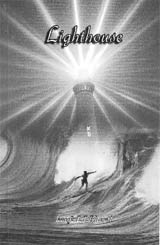|
Short Takes
On overcoming odds
Reviewed by Randeep Wadehra
Lighthouse
by Prof I.J. Bharti
National Handicapped Welfare Council, Haryana. Pages: 120. Rs. 200
 Blindness
is one of the most disabling afflictions that can visit anyone.
It is unimaginable that a blind person can survive in today’s world.
In fact, let alone the visually challenged, physically and mentally
challenged persons, too, are vulnerable to all sorts of perils – known
or unknown. Worse, there are predators in human form who do not hesitate
while preying on such vulnerable persons. In order to overcome such a
condition, it is essential to know its genesis. Then only it can be
effectively tackled through therapy or by providing a support system. Blindness
is one of the most disabling afflictions that can visit anyone.
It is unimaginable that a blind person can survive in today’s world.
In fact, let alone the visually challenged, physically and mentally
challenged persons, too, are vulnerable to all sorts of perils – known
or unknown. Worse, there are predators in human form who do not hesitate
while preying on such vulnerable persons. In order to overcome such a
condition, it is essential to know its genesis. Then only it can be
effectively tackled through therapy or by providing a support system.
This book briefly
describes the manner in which the likes of Surdas, Helen Keller and John
Milton overcame their visual handicaps and blazed trails of creativity.
However, its main focus is on explaining the various causes of blindness
like cataract, glaucoma, diabetic retinopathy, trachoma etc. It also
narrates how Louis Braille, who had become blind in his childhood due to
an accident, invented the Braille System that helped visually challenged
persons to acquire various skills, enabling them to live with dignity.
You will also find chapters on computers, senior citizens, eye donation
etc, apart from rights and welfare issues; informative stuff.
You too can be a
Genius
by Brig HR Sharma
Third Eye. Pages: xi+164. Rs. 195
 Thomas Carlyle once
described the term ‘genius’ as first and foremost "transcendent
capacity to take trouble". In other words, whatever natural gift
one may have it will require consistent hard work to fructify. In the
words of the famous Spanish violinist, the late Pablo Sarasate, "A
genius! For 37 years I’ve practised 14 hours a day, and now they call
me a genius!" Thomas Carlyle once
described the term ‘genius’ as first and foremost "transcendent
capacity to take trouble". In other words, whatever natural gift
one may have it will require consistent hard work to fructify. In the
words of the famous Spanish violinist, the late Pablo Sarasate, "A
genius! For 37 years I’ve practised 14 hours a day, and now they call
me a genius!"
This book also conveys the
same message but in a far more detailed and systematic manner. It
expects the wannabe genius to first know what (s)he is really good at,
i.e. know the characteristics of the talent one has. In order to develop
the capacity for using the inherent talent it is essential to analyse
one’s strengths and weaknesses. Thence set the goals and manage the
time in an optimum manner. This book also tells us how to overcome our
negative attitudes and restrictive beliefs, and develop a positive
mindset. Then, it goes on to explain how it is important to acquire good
conversational skills and manage various relationships. Above all,
self-belief is of paramount importance. As Robert Browning avers,
"Ah, but a man’s reach should exceed his grasp,/Or what’s a
heaven for?"
Colours of my Heart
by Surjeet Kalsey
Tarlochan Publishers. Pages: 96. Rs. 160
 In this solitude,/after
all this (sic) broken things/your body did not leave the house./I
was punished to live/with a dead body/which silently was eroding/ my
energies my self-esteem/and was stealing my soul!" This plaint
from the poem ‘Living with the dead’ illustrates the poet’s
somber reflections on vagaries of life. ‘The Priority’ dwells
upon the manner in which women are treated in the society. However, if
you are under the impression that this is an anthology of laments,
banish the thought. There is a streak of feminist assertiveness in the
poem ‘A Warrior’ when she proclaims, "I am a woman
warrior/who believes in Self/and only in myself/and does not need
Krishna/to be my charioteer/and utter sermons from the Gita".
The feminist motif is predominant in this collection, as typified by the
poem ‘I don’t intend`85’ I am using the term ‘feminist’
here not in the now pass`E9, Americanised bra-burning sense but more as
a woman’s demand for her rightful place in the society. In this solitude,/after
all this (sic) broken things/your body did not leave the house./I
was punished to live/with a dead body/which silently was eroding/ my
energies my self-esteem/and was stealing my soul!" This plaint
from the poem ‘Living with the dead’ illustrates the poet’s
somber reflections on vagaries of life. ‘The Priority’ dwells
upon the manner in which women are treated in the society. However, if
you are under the impression that this is an anthology of laments,
banish the thought. There is a streak of feminist assertiveness in the
poem ‘A Warrior’ when she proclaims, "I am a woman
warrior/who believes in Self/and only in myself/and does not need
Krishna/to be my charioteer/and utter sermons from the Gita".
The feminist motif is predominant in this collection, as typified by the
poem ‘I don’t intend`85’ I am using the term ‘feminist’
here not in the now pass`E9, Americanised bra-burning sense but more as
a woman’s demand for her rightful place in the society.
The poet also portrays
other moods ranging from reflections on lunar waxing and waning to
self-abnegation. Editorial inputs and proofreading would have enhanced
the poems’ readability.
|